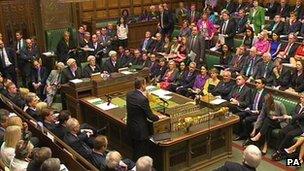Abstain in EU vote, Tory ministers advised
- Published

Tory ministers are being advised to abstain if there is a Commons vote on the lack of any new law bringing in a referendum on the UK's EU membership.
Tory rebels have drawn up an amendment which criticises last week's Queen's Speech for not including any bill paving the way to a referendum.
About 100 Conservative MPs could back it, although Labour and Lib Dem MPs are expected to oppose it.
David Cameron has promised a referendum if the Tories win the next election.
A group of Conservative backbenchers have been campaigning for him to firm up this commitment by legislating in the current Parliament for a referendum.
In their amendment, the MPs state that they "respectfully regret that an EU referendum bill was not included" in last week's the Queen's Speech, which lays out the government's legislative plans for the year ahead.
The Speaker of the House of Commons, John Bercow, has yet to decide whether to select the amendment for debate.
But if the debate and vote go ahead on Wednesday, ministers will be "guided" to abstain, a senior source told the BBC.
Other MPs, including ministers' parliamentary aides, will be free to vote with their consciences.
One of them - Gavin Barwell, parliamentary private secretary to Education Secretary Michael Gove - has already said that he intends to support the amendment.
The amendment has been signed by nearly 30 Tory backbenchers, including former Cabinet minister Cheryl Gillan and former leadership contender David Davis, as well as two Labour MPs, and it is thought about 100 backbench MPs could back it in a vote.
But the amendment would stand little chance of being passed because Labour and Liberal Democrat MPs would vote against it - as would many Conservatives.
Conservative unrest over Europe has gained fresh momentum following the recent election success of the UK Independence Party and comments by Tory grandees such as Lord Lawson suggesting EU withdrawal.
Mr Cameron has promised a referendum if the Tories win the next general election, due in 2015.
The prime minister has said a pledge to hold an in/out vote by 2017, once he has negotiated the return of some powers from Brussels, will be in the next Conservative manifesto.
Mr Cameron will not vote himself on the amendment as he will be out of the country on a trip to the US.
He has told the rebels he cannot introduce a bill paving the way for this because of opposition from his Liberal Democrat coalition partners.
'Navel-gazing'
Speaking to the Labour group Progress on Saturday, Labour leader Ed Miliband said the prime minister was "hiding behind the sofa", too scared to confront his party.
Mr Miliband said: "It is wrong now to commit to an in/out referendum and have four years of uncertainty and a 'closed for business' sign above our country."
Labour aides stressed that Mr Miliband was opposing the decision to signal a referendum now but not ruling out the possibility of a referendum in the future.
Conservative Party Chairman Grant Shapps said: "David Cameron will give the British people their say on our future in Europe in an in-out referendum in the next parliament.
"But Ed Miliband has once again made clear he will never trust the British people to have their say - he opposes a referendum. He is too weak to stand up for the British people at home and too weak to stand up for our country's interests abroad."
But Deputy Prime Minister Nick Clegg criticised his coalition partners about their "endless navel-gazing over Europe," which he said was in danger of distracting the government from its priorities.
In his weekly email to Lib Dem members, he said: "Our job is to anchor the government in the centre ground, stopping others from lurching this way and that, and making sure the government delivers our core objectives: a stronger economy in a fairer society."
- Published11 May 2013
- Published10 May 2013
- Published8 May 2013
- Published7 May 2013
- Published23 January 2013